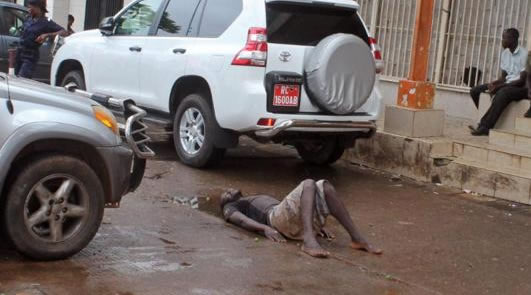Liberia’s Ebola cases to hit 10,000 by Nov.2

 A new study by the World Health Organization, carried out with Imperial College London, has forecast that, if no significant action were taken, the cumulative number of confirmed and probable Ebola cases in Liberia by November 2 would hit 10,000 follow by 6,000 in Guinea, and 5,000 in Sierra Leone, respectively.
A new study by the World Health Organization, carried out with Imperial College London, has forecast that, if no significant action were taken, the cumulative number of confirmed and probable Ebola cases in Liberia by November 2 would hit 10,000 follow by 6,000 in Guinea, and 5,000 in Sierra Leone, respectively.
The French news agency or AFP says Liberia, the hardest-hit nation in the region, has seen 3,000 cases and almost 1,600 deaths, with health workers turning people away from treatment units due to chronic shortages of beds and staff.
Liberia reportedly has some 150 foreign specialised medical workers on the ground and needs at least 600, with the aim of scaling her current 400 Ebola beds up to around 2,000 within weeks.
The country’s response effort has been bolstered by a US military mission, already deploying, which will see 3,000 troops providing training and logistics.
The WHO said that the number of Ebola infections in West Africa could explode in the region unless current international response is radically intensified, predicting tens of thousands of cases by the end of the year. It warned on Tuesday in a report that new cases would increase from hundreds each week to thousands without “drastic improvements in control measures”, with infections more than tripling to 20,000 by November.
“We’ve rather modestly only extended the projections to November 2, but if you go to… January 2, you’re into hundreds of thousands,” the French news agency or AFP quote WHO head of strategy, Christopher Dye, who is a co-author of the study.
The research paper further warns that the outbreak could drag out for years and become entrenched in West Africa, which has already seen almost 3,000 deaths.
UN deputy special representative for recovery and governance, Antonio Vigilante, likens the struggle to “trying to remedy an earthquake when it is happening”.
[bsa_pro_ad_space id=1]
Liberia said Tuesday the slow international response risked allowing the country to slide back into civil war alongside neighbouring Sierra Leone, and could reignite civil unrest in Guinea. “The world cannot wait for Liberia, Sierra Leone and Guinea to slip back into conflict, which could be the result of this slowness in response,” Liberia’s Information Minister, Lewis Brown, told AFP late Monday.
Ebola fever can fell its victims within days, causing severe muscle pain, vomiting, diarrhoea and — in many cases — unstoppable internal and external bleeding. It is one of the deadliest viruses known to man, the AFP writes. The current crisis, which quietly began in southern Guinea last December, has killed far more than all other Ebola outbreaks combined.
He noted that while the virus ravaging West Africa was acting similarly to previous outbreaks, what has changed is the density and mobility of the population affected. Cultural practices like washing and touching dead bodies have compounded the problem, as has the very slow response in countries never before hit by the virus and by the international community, he said.
Weak health systems in the hardest-hit countries are also largely to blame, said Christl Donnelly, a professor of statistical epidemiology at the Imperial College and a co-author of the study.
“In Nigeria, for example, where health systems are stronger, the number of cases has so far been limited, despite the introduction of infection into the large cities of Lagos and Port Harcourt,” she said. Ebola is only transmitted through contact with body fluids, so halting its spread is usually relatively simple.




















